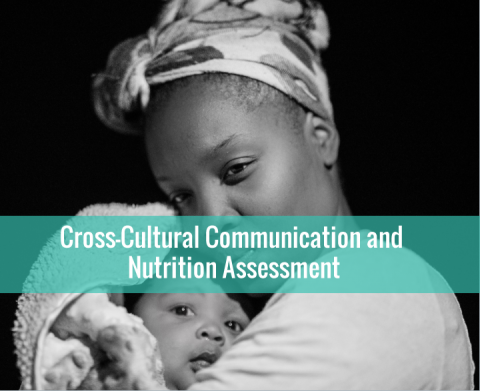This course is designed for WIC personnel and other health care providers who complete nutrition assessments. Awareness of cross-cultural communication allows WIC personnel to create a more rich and enhanced assessment and counseling experiences with clients. The goals of the course are to:
- Describe cross-cultural communication and why it is necessary in practice.
- Provide examples of effective communication techniques when completing nutrition assessments.
- Identify appropriate communication strategies when working with clients that have a language difference.
Content
There are three sections in this course:
- Section 1: Cross-Cultural and Communication Techniques
- Section 2: Communicating with Language Differences
- Section 3: Scenarios and Game
There are review questions at the end of section 1 and 2. These review questions will provide you with an opportunity to apply the knowledge and skills presented in these sections. In section 3, there are three scenarios that will allow you to apply the knowledge that you just learn. "The Effective Non-Verbal Communication" game is provided as a fun activity to enhance content retention. Finally, there is a posttest at the end of the course.
Intended Audience
WIC CPAs (competent professional authorities) who perform nutrition assessments for WIC participants. The course will provide overview information on cultural competence in relation to feeding and eating practices and is not intended to be inclusive of all information needed. Some contents may also applicable to health care providers and public health professionals who are communicating with clients from diverse background.
Learning Objectives
Section 1: Cross-Cultural and Communication Techniques
After completing this section, participants will be able to:
- Identify client demographics and their backgrounds.
- Recognize the importance of cross-cultural communication.
- Recognize how your culture and background may influence your communication skills during nutrition assessment.
- Identify communication challenges when working with multicultural clients.
- Identify ways to establish trust and build rapport with participants.
- Apply effective communication techniques when completing nutrition assessment.
Section 2: Communicating with Language Differences
After completing this section, participants will be able to:
- Describe the process of selecting and working with interpreters and language lines.
- Identify the appropriate strategies when communicating with clients that have language differences.
- Define low literacy and health literacy.
Section 3: Scenarios and Game
After completing this section, participants will be able to:
- Apply the practice of cultural sensitivity and critical thinking when completing nutrition assessment.
Pre-requisites/Learning Level
No Pre-requisites
Core Competencies for Public Health Professionals
Domain 3: Communication Skills
- 3A1. Identifies the literacy of populations served (e.g., ability to obtain, interpret, and use health and other information; social media literacy)
- 3A2. Communicates in writing and orally with linguistic and cultural proficiency (e.g., using age-appropriate materials, incorporating images)
Domain 4: Cultural Competency Skills
- 4A3. Describes the ways diversity may influence policies, programs, services, and the health of a community
- 4A5. Addresses the diversity of individuals and populations when implementing policies, programs, and services that affect the health of a community
Certificate of Completion
A certificate of completion is awarded on successful completion of this course. In order to successfully complete this course, you MUST score 70% or higher on the Posttest.
If you do not receive 70% on the posttest, you may review the material and re-take it. The posttest will become available for a re-take 2 business days after your first attempt.
Contact Hours/CEUs Offered
This course no longer provides continuing education by the Iowa Board of Nursing and the Commission on Dietetic Registration
Cost
Free
Modality/format
Online Self-Pace
Length
2 hours
Presenter(s) and/or Content Experts Planning Course Committee Members
Nor Hashidah Abd-Hamid, PhD; Urmil Aggarwall, MS, RD, LD; Brenda Dobson, MS, RD, LD; Dena Fife, MA; Pat Hildebrand, MS, RD, LD; Kim Staab, RN; Marilyn Alger, MSW; Janice Edmunds-Wells, MSW; Debra Kibbe, MS; Michele Devlin, DrPH; Mark Grey, PhD
Technical Requirements
- Adobe Acrobat Reader
- Speakers
Registration requirements
Register a free account
Acknowledgements
The following organizations collaborated on the development of this course: United States Department of Agriculture (USDA), Food and Nutrition Service; Iowa Department of Public Health (IDPH)- Iowa WIC Program; University of Iowa College of Public Health Institute for Public Health Practice (UICPH-IPHP); and Region 7 Midwestern Public Health Training Center (MPHTC).
A special thanks also to our video dialogue models: Charles Dufano, Dena Fife, and Mary Klahn-Ramstad.
This project is funded at least in part with Federal funds from the U.S. Department of Agriculture, Food and Nutrition Service.
Course Redesign and Redevelopment (January 2019):
Nor Hashidah Abd-Hamid, Instructional Design and Development
Melissa Richlen, Audio and Video Production
Brett Borden, Narrator
Tim Beachy, LMS Coordinator
Creation and/or update
January 15, 2019





